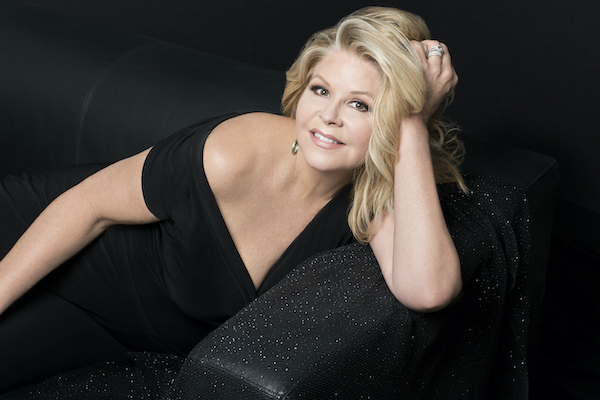Susan Graham and friends bring back the opera at live WNO gala

Susan Graham performed at Washington National Opera’s gala Saturday night. File photo: Dario Acosta
David Rubenstein, chairman of the Kennedy Center’s Board of Trustees, presented the Washington National Opera Gala audience with a sobering figure Saturday night. According to one estimate he cited, 10% of performing arts organizations in the United States will not survive the coronavirus pandemic.
Happily, thanks largely to the deep-pocketed supporters who heard that speech, WNO will not be among the casualties. This year’s unusual gala, spread out over several days and partly virtual, raised more than $1.32 million. That figure is yet another tribute to the evening’s honoree, longtime WNO patroness Selwa “Lucky” Roosevelt, who presided over the festivities with her customary grace.
The live component of the gala was a recital by mezzo-soprano Susan Graham, heard by about two hundred guests, including this writer. The audience, seated on the Opera House stage, faced toward Graham and pianist Bradley Moore, situated on a platform at the edge of the stage, with the empty house behind her. Gesturing to the red seats and glowing chandeliers at her back, Graham joked that the audience had the better view. “But I’ve seen it before, and maybe I will again,” she quipped.
Graham opened with the French repertoire for which she is justly known. Impeccable French and a sensitively declaimed melodic line marked the “Villanelle” from Berlioz’s Les Nuits d’été, a signature Graham piece. Moore vamped through the prelude of the “Habanera” from Bizet’s Carmen, as Graham introduced the character, which she has yet to assay on the stage. Ever the consummate performer, Graham poured on the charm for this famous tune.
Carmen will be the only grand opera performed by WNO in the Opera House in the coming season. It also happens to be Lucky Roosevelt’s middle name, and as she reminisced later in the evening, the first opera she ever saw, at age 11. Graham extended the tribute with “C’est ça la vie, c’est ça l’amour” from Toi c’est moi, an operetta by Moisés Simons, which riffed on the story of Carmen.
Three singers from WNO’s Cafritz Young Artists program took the stage for a few more operatic favorites. Tenor Matthew Pearce floated the ascending final phrase of “La fleur que tu m’avais jetée,” also from Carmen. Soprano Suzannah Waddington showed off some high-flying vocal fireworks in “Me llaman la primorosa” from the zarzuela El barbero de Sevilla, by Gerónimo Giménez and Manuel Nieto.
Soprano Katerina Burton outpaced Pearce, who returned for selections from the end of Act I of Puccini’s La Bohème. Burton opened this excerpt with a commendable rendition of “Sì, mi chiamano Mimì,” expressive and lyrical, but also with the needed power for the exultant parts. The duo’s closing high Cs came out south of the mark, but the future of opera looks hopeful. All three young performers benefitted from Moore’s supportive partnership at the piano.
Graham catered to the opera fanatics in the crowd with two of her celebrated roles. Her intense, nostalgic take on “Adieu, fière cité,” Dido’s final aria from Berlioz’s Les Troyens, renewed hopes that WNO might mount its first production of that mammoth, glorious opera someday soon. Both Graham and WNO artistic director Francesca Zambello reminisced about the production they collaborated on at the Metropolitan Opera a decade ago. Hopefully a generous future patron was among the gala audience and got the hint.
Before “Wie du Warst!” from Strauss’s Der Rosenkavalier, Graham joked that since Renée Fleming “couldn’t be here,” she would be singing both Octavian and the Marschallin. Then she really did proceed to jump back and forth to perform both sides of this pillow-talk dialogue that opens the opera. It was yet another moment that proved the diva bona fides of Susan Graham, as she purred and strutted her way through both roles.
Graham then did herself one better in the obligatory popular song set that concluded the recital. She took over Moore’s piano bench to accompany herself in “La Vie en Rose,” complete with the guttural Rs of Edith Piaf, who made the song famous. The song, which Graham signaled was also a Lucky Roosevelt favorite, was rounded out by a verse in English, adding to the impression that Graham could go on to a second career as a nightclub chanteuse.
The mezzo’s take on Gershwin’s “Fascinating Rhythm” was energetic, if less idiomatic. Graham recovered ably with a song she discovered during the pandemic. Taken from Kurt Weill’s final, abortive musical, Huckleberry Finn, its title, “This Time Next Year,” became doubly bittersweet for an audience hearing live music after the long silence of the pandemic. Indeed, it will be yet another year before grand opera returns to this stage with Carmen.
Virtual components of the WNO Opera Gala can also be streamed through July 11. kennedy-center.org
